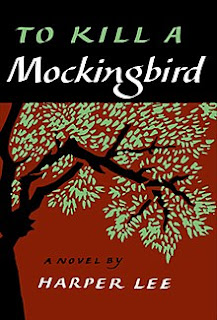I vaguely remember reading To Kill a Mockingbird (1960) by Harper Lee in school, but I'm glad I decided to reread it when I saw it on my 50 Books Every Woman Should Read Before She Turns 40 List. I can't remember how old I was when I first picked it up, but as I reread this book I realized that I'd forgotten many of the details of the story. In addition, my perspective has changed dramatically. When I first read the book, I wholly identified with Scout. There also must have been some parts of the story that went over my head. Now that I'm an adult with some legal training and much more awareness of race and injustice, I both appreciated this book more and had some quiet problems with it.
To Kill a Mockingbird is an undeniable classic. It won a Pulitzer Prize, is on all kinds of lists, and is widely read by schoolchildren and adults alike. I was impressed by the impact of both the writing and the story.
The book begins when the precocious, tomboy Jean Louise "Scout" Finch is only six years old. An adult Jean Louise is looking back at the events that led up to the summer when her brother Jem broke his arm. Jem is four years older than Scout, and the book covers the two summers leading up to Jem's injury. Jem and Scout live with their widowed father, Atticus, and their housekeeper/nanny Calpurnia. Jem and Scout are content to spend their summer days carousing the neighborhood with their friend, Dill. They are a little obsessed with their mysterious neighbor, Boo Radley, who has not left his house since he was a young man, and they get into some trouble trying to discover him.
It takes a little while for the news to filter down to Scout, and even longer for her to understand, that her father was appointed to defend Tom Robinson, a local "negro" on the charges of rape of a poor, young woman, Mayella Ewell. Tom Robinson is assumed guilty and Atticus and his kids are judged for his defense of him. Atticus feels that Tom Robinson deserves a solid defense even though he has little to no chance of being found innocent. In a small, Southern town characterized by incredible systemic racism and before black men (or women) could even be on juries, Atticus's defense of Tom Robinson was isolating, dangerous, and brave. When Robinson is transferred to the local jail for the trial, Atticus takes it upon himself to ensure his safety from a possible lynch mob.
Scout is a unique and memorable character. Her description of school and her resistance to conform to what was expected of her as a lady was fun to read. In addition, seeing the drama of lynch mobs, trials, and injustice from the eyes of a child is a different and affecting way to tell this story. I think it has a lot of good things to say about injustice and treating people equally and with kindness. Atticus Finch is almost too perfect and honorable to be true. He is always patient, wise, and never afraid. He stands up for what is right no matter the consequences. However, since we are seeing him through Scout's eyes, it's very possible she misses some of his inner turmoil.
Reading this book as an adult, I realized that I focused more on Tom Robinson than Scout--after all his story is the most tragic and unjust. I've read a number of books about racism and oppression as seen through the eyes of white people (The Power of One, The Help) and this one is very similar. The white person is the hero, and the book is all about how the racism affects them. The injustice of Tom Robinson's story is enraging and heartbreaking, and it seems too easily put away in the end with Ewell's death. I would like a writer (a really, really good writer who wouldn't ruin it) to tell this story from Tom Robinson's point of view.
As the only person in town willing and brave enough to defend a black man, Atticus is a hero. But something still rubbed me the wrong way. Atticus knows that everything he's doing will not make any difference. Although Atticus says that he is hopeful that the conviction will be overturned on appeal, he never says what those grounds might be. There are questions of fact, which are for the jury to decide. The jury heard conflicting testimony and decided they believed the Ewell family. I don't see how the appellate court, even if they are sympathetic to a young, black man in Alabama in the 1930's (unlikely) could possibly overturn the conviction. So Atticus has become a willing participant in a charade of justice. I realize he is doing everything he can and certainly going above and beyond, but I was so angry at what was happening that I was angry at Atticus for even being involved. What good is he actually doing? Realistically, I don't know what else Atticus could have done, and it is a testament to the book that the story makes me feel so strongly.

No comments:
Post a Comment